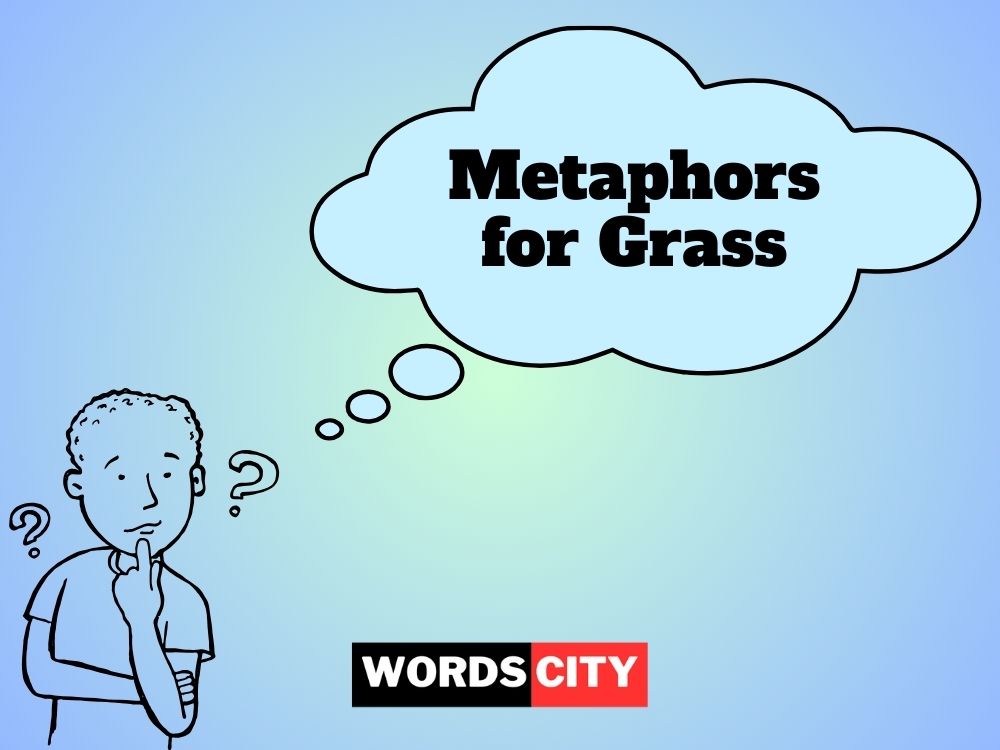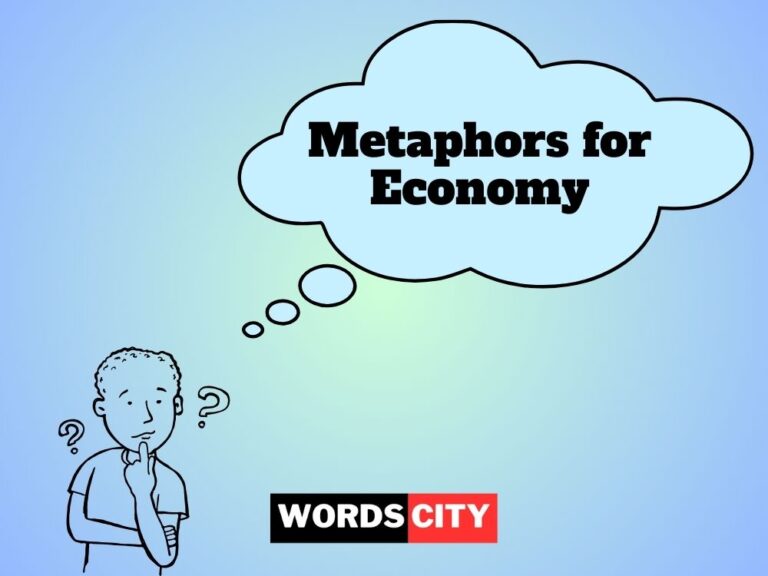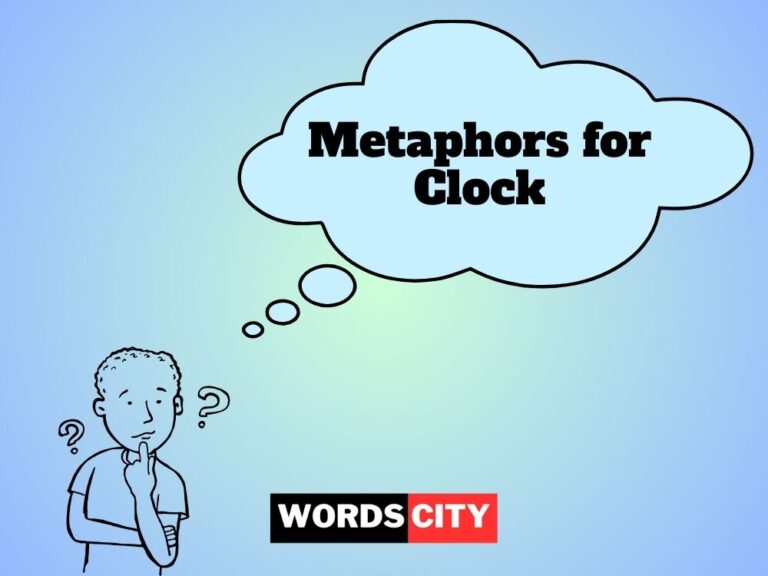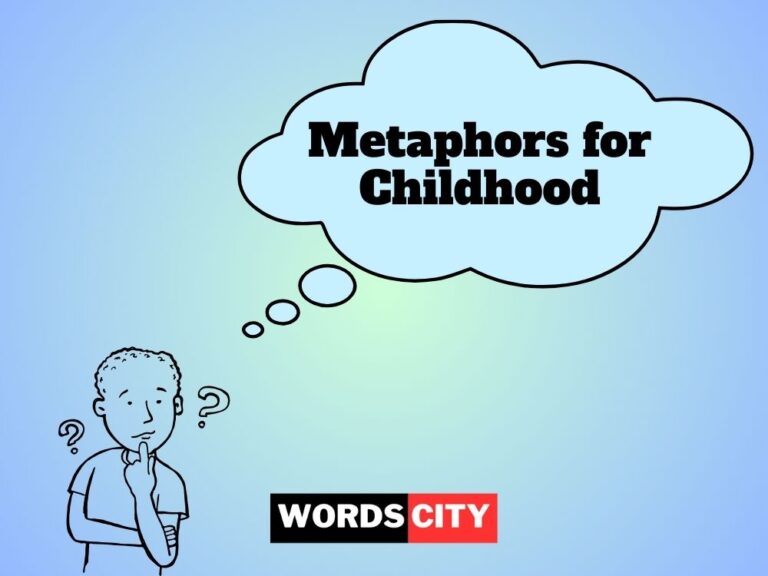Grass is more than just something that grows beneath our feet—it can be a symbol of renewal, of fragility, of connectedness, and of quiet power.
Through metaphors, we can explore how grass speaks to the human experience: how it grows back after being stepped on, how it stretches toward the sun even in poor soil, and how it bends but doesn’t break in the wind.
Metaphors are like little mirrors to meaning—they help us see deeper layers of life. In this post, you’ll find 50 rich metaphors about grass, each one crafted to bring out a new way of seeing this humble yet profound piece of nature.
Metaphors for Grass
1. A Green Quilt of the Earth
Meaning: Grass is seen as a soft, comforting blanket covering the land.
In a Sentence: After the winter snow melted, the field revealed a green quilt of the earth, stitched together by blades of new grass.
Other Ways to Say: Nature’s blanket, Earth’s soft layer
2. The Earth’s Hair
Meaning: Grass is like the hair of the earth, growing wild and free.
In a Sentence: As the wind blew through the meadow, the grass swayed like the earth’s hair dancing in a silent rhythm.
Other Ways to Say: Natural strands, Nature’s tresses
3. Whispering Threads of Nature
Meaning: Grass as a quiet voice or subtle presence in nature.
In a Sentence: The lawn was full of whispering threads of nature, rustling secrets in the breeze.
Other Ways to Say: Silent voices, Soft messengers
4. A Living Carpet
Meaning: Grass is compared to a soft, living surface that covers land.
In a Sentence: We lay on the living carpet beneath the stars, the grass breathing lightly under our backs.
Other Ways to Say: Verdant flooring, Green bed
5. The Skin of the Earth
Meaning: Grass is imagined as a thin, protective layer over the surface of the planet.
In a Sentence: With every step through the meadow, we touched the skin of the earth, tender and full of life.
Other Ways to Say: Surface veil, Earth’s covering
6. The Earth’s Smile
Meaning: Grass symbolizes the earth’s happiness and vitality.
In a Sentence: When spring arrived, the hills stretched wide with the earth’s smile, blooming with emerald grass.
Other Ways to Say: Nature’s grin, Verdant expression
7. Green Fire Without Flame
Meaning: Grass is described as something vibrant and alive, yet not destructive.
In a Sentence: The prairie blazed with green fire without flame, burning with life under the midday sun.
Other Ways to Say: Living energy, Gentle blaze
8. Nature’s Stubble
Meaning: Grass is likened to the roughness of facial hair, especially on uneven or recently mowed land.
In a Sentence: After the tractor had passed, the field was left with nature’s stubble, short and freshly cut.
Other Ways to Say: Shorn turf, Rugged green
9. Blades in Formation
Meaning: Grass is imagined as soldiers standing together in uniform rows.
In a Sentence: The soccer field stood still under the morning fog, its blades in formation like a silent green army.
Other Ways to Say: Green ranks, Turf troops
10. The Earth’s Soft Voice
Meaning: Grass is portrayed as a gentle communicator of natural calm and peace.
In a Sentence: In the hush of early dawn, the grass spoke with the earth’s soft voice, soothing my anxious thoughts.
Other Ways to Say: Quiet presence, Grounded whisper
11. Nature’s Needlework
Meaning: Grass is seen as fine embroidery stitched by the hand of nature.
In a Sentence: The hills rolled like a green tapestry, nature’s needlework perfect in its quiet detail.
Other Ways to Say: Woven terrain, Stitched slopes
12. Green Echoes of Rain
Meaning: Grass is described as the visible result or memory of rainfall.
In a Sentence: After the storm passed, the backyard echoed with green, each blade a fresh whisper from the rain.
Other Ways to Say: Rain’s reply, Storm’s souvenir
13. Hope Sprouting in Silence
Meaning: Grass represents quiet but persistent hope.
In a Sentence: Even in the ruins, hope was sprouting in silence through the cracks—small blades of grass reclaiming space.
Other Ways to Say: Quiet resilience, Living promise
14. A Field of Silent Applause
Meaning: Grass is imagined as quietly clapping or rejoicing in the breeze.
In a Sentence: As the wind swept through, the field of silent applause waved gently, celebrating the morning sun.
Other Ways to Say: Wordless joy, Breezy praise
15. Nature’s Fingertips
Meaning: Grass is likened to the earth’s way of feeling or reaching out.
In a Sentence: The dewy lawn felt like nature’s fingertips, cool and curious against my toes.
Other Ways to Say: Green touch, Earth’s caress
16. Green Paint on Life’s Canvas
Meaning: Grass as an element of visual artistry in nature.
In a Sentence: The valley looked like a painting, brushed with green paint on life’s canvas, alive and textured.
Other Ways to Say: Living palette, Nature’s artwork
17. Breath of the Soil
Meaning: Grass is seen as the soil’s way of breathing and expressing life.
In a Sentence: Every blade that swayed in the morning breeze felt like the breath of the soil, gentle and vital.
Other Ways to Say: Earth’s exhale, Life from below
18. A Sea of Green Blades
Meaning: Grass is metaphorically described as a sea with movement and depth.
In a Sentence: I stood in awe as the prairie rippled like a sea of green blades, moving as one under the wind.
Other Ways to Say: Verdant ocean, Grassy waves
19. The Earth’s Softest Armor
Meaning: Grass is portrayed as a protective but gentle shield for the land.
In a Sentence: Beneath our feet, the earth wore its softest armor, cushioning each step with grassy grace.
Other Ways to Say: Living shield, Ground layer
20. Green Memories in the Wind
Meaning: Grass represents history and life carried through time.
In a Sentence: The old cemetery lawn carried green memories in the wind, whispering stories of those who had come before.
Other Ways to Say: Echoes of life, Memory field
21. The Earth’s Feathered Touch
Meaning: Grass is seen as a gentle, feather-light extension of the land.
In a Sentence: As I walked barefoot through the meadow, the earth’s feathered touch tickled my soles and lifted my spirit.
Other Ways to Say: Nature’s brush, Soft contact
22. A Blanket of Calm
Meaning: Grass is imagined as a peaceful covering over a chaotic world.
In a Sentence: After a long, tiring day, I sat on a blanket of calm, the grass wrapping me in stillness and simplicity.
Other Ways to Say: Restful ground, Calm cushion
23. The Earth’s First Whisper
Meaning: Grass symbolizes the earliest signs of life or growth.
In a Sentence: The first signs of spring showed themselves in the earth’s first whisper—soft green shoots curling through the frost.
Other Ways to Say: New beginnings, Gentle start
24. Nature’s Gentle Armor
Meaning: Grass is depicted as a form of protection that’s also delicate.
In a Sentence: Beneath the orchard trees, nature’s gentle armor cushioned the ground and shielded it from the blazing heat.
Other Ways to Say: Soft defense, Protective green
25. A Symphony of Blades
Meaning: Grass is seen as an ensemble working in harmony, like music.
In a Sentence: When the wind passed through the field, it played a symphony of blades, each one bending to the rhythm of nature.
Other Ways to Say: Green orchestra, Natural harmony
26. The Canvas Beneath Our Lives
Meaning: Grass is described as the background on which our lives unfold.
In a Sentence: Birthdays, picnics, and quiet moments have all been sketched across the canvas beneath our lives—green, vibrant grass.
Other Ways to Say: Life’s backdrop, Living foundation
27. A Breathable Quilt of Peace
Meaning: Grass is imagined as a light, natural covering that brings tranquility.
In a Sentence: I lay down and felt the breathable quilt of peace beneath me, the grass gently lifting and falling with the breeze.
Other Ways to Say: Peaceful spread, Soothing fabric
28. Soft Soldiers of the Soil
Meaning: Grass is described as strong yet silent defenders of nature.
In a Sentence: The soft soldiers of the soil stood tall after the storm, their green resilience unshaken by the wind.
Other Ways to Say: Ground warriors, Quiet strength
29. Emerald Hairs of the Land
Meaning: Grass is seen as delicate strands that bring color and life.
In a Sentence: Under the sun, the emerald hairs of the land shimmered, catching light like tiny treasures.
Other Ways to Say: Shining strands, Green threads
30. A Playground for Shadows
Meaning: Grass is portrayed as the space where movement and light play together.
In a Sentence: As the sun dipped low, the lawn became a playground for shadows, grass blades stretching and shrinking in silent play.
Other Ways to Say: Light’s canvas, Dancing field
31. Nature’s Daily Rebirth
Meaning: Grass symbolizes the repetition of life and renewal.
In a Sentence: Each morning, dew-laced blades welcomed the dawn like nature’s daily rebirth—alive, fresh, and ready to grow again.
Other Ways to Say: New day’s breath, Morning rise
32. The Soft Green Pulse of Earth
Meaning: Grass represents life beating just beneath the surface.
In a Sentence: Lying in the tall grass, I could almost hear the soft green pulse of Earth, steady and eternal.
Other Ways to Say: Ground heartbeat, Living thrum
33. A Forest in Miniature
Meaning: Grass is imagined as a tiny, thriving forest full of micro-life.
In a Sentence: To an ant, the lawn must seem like a forest in miniature—dense, endless, and buzzing with mystery.
Other Ways to Say: Tiny jungle, Mini wilderness
34. The Earth’s Gentle Fur
Meaning: Grass is seen as a soft, protective fur covering the world.
In a Sentence: As I patted the hillside, I felt the earth’s gentle fur—warm, familiar, and full of stories.
Other Ways to Say: Soft hide, Verdant coat
35. A Green Mural Painted by Rain
Meaning: Grass is depicted as a vibrant display born from water and soil.
In a Sentence: After a week of rain, the hillside transformed into a green mural painted by rain, each blade a stroke of life.
Other Ways to Say: Nature’s wall art, Moist masterpiece
36. The Humble Crown of Nature
Meaning: Grass is imagined as a modest but majestic covering for the land.
In a Sentence: Though often overlooked, the humble crown of nature—grass—holds the power to feed, shelter, and heal.
Other Ways to Say: Modest royalty, Natural tiara
37. The Earth’s Everlasting Whisper
Meaning: Grass is seen as a constant, soft presence across seasons and places.
In a Sentence: Even when everything else changes, the earth’s everlasting whisper is there—green, growing, and gently speaking.
Other Ways to Say: Perpetual murmur, Eternal green
38. A Tapestry of Patience
Meaning: Grass symbolizes slow, steady growth and resilience.
In a Sentence: You don’t rush grass—its tapestry of patience unfolds one blade at a time, season after season.
Other Ways to Say: Slow growth, Calm persistence
39. A Choir of Quiet Green
Meaning: Grass is imagined as silent harmony singing together.
In a Sentence: The field sang a soft song, a choir of quiet green echoing through the countryside.
Other Ways to Say: Silent chorus, Green hymn
40. The Land’s Invitation to Rest
Meaning: Grass is described as a welcoming, restful place offered by nature.
In a Sentence: Beneath the tree, the land’s invitation to rest was written in blades of grass, cool and comforting.
Other Ways to Say: Ground’s embrace, Nature’s pause
41. The Pulse Beneath Civilization
Meaning: Grass symbolizes the persistent natural world under modern development.
In a Sentence: Even under city sidewalks and cracked parking lots, you’ll find the pulse beneath civilization—grass pushing its way back.
Other Ways to Say: Nature’s heartbeat, Life beneath the surface
42. Nature’s Gentle Persistence
Meaning: Grass is a quiet force that continues despite being cut or stepped on.
In a Sentence: No matter how many times it’s trimmed, nature’s gentle persistence rises again—each blade a quiet act of defiance.
Other Ways to Say: Quiet resilience, Ever-returning green
43. A Diary Written in Green
Meaning: Grass tells a story of time, growth, and change.
In a Sentence: Every patch of grass is a diary written in green—its wear, thickness, and hue recording footsteps, rain, and seasons.
Other Ways to Say: Green journal, Earth’s memory
44. The Earth’s Natural Veins
Meaning: Grass is described as the network through which the earth breathes and nourishes.
In a Sentence: From above, the meadows looked like the earth’s natural veins, pulsing softly with life and connection.
Other Ways to Say: Living pathways, Vital threads
45. A Cradle for Crawlers
Meaning: Grass is seen as a welcoming place for small creatures and young life.
In a Sentence: The backyard turned into a cradle for crawlers—ladybugs, worms, beetles, all nestled between the blades.
Other Ways to Say: Bug’s bed, Nature’s nursery
46. A Green Flame That Doesn’t Burn
Meaning: Grass is like fire in appearance—alive, flickering—but it nourishes rather than destroys.
In a Sentence: Under the setting sun, the field looked like a green flame that doesn’t burn—alive and full of motion.
Other Ways to Say: Cool blaze, Living fire
47. Ground’s Gentle Applause
Meaning: Grass is imagined as clapping silently in appreciation of nature.
In a Sentence: As the breeze moved through the yard, the ground’s gentle applause welcomed the coming night.
Other Ways to Say: Whispering ovation, Quiet celebration
48. The Earth’s First Decoration
Meaning: Grass is seen as nature’s earliest ornament, decorating the land with life.
In a Sentence: Before flowers bloom or trees sprout, the earth’s first decoration appears—thin, green, and full of promise.
Other Ways to Say: Initial adornment, Nature’s opening act
49. A Silent Anthem of Growth
Meaning: Grass represents the quiet and constant growth in life.
In a Sentence: The meadow hummed with a silent anthem of growth—each blade rising without fanfare, yet full of purpose.
Other Ways to Say: Growth hymn, Nature’s quiet song
50. The Green Breath of Home
Meaning: Grass is symbolic of comfort, roots, and belonging.
In a Sentence: No matter how far I travel, stepping onto the lawn brings me peace—it’s the green breath of home.
Other Ways to Say: Grounded comfort, Familiar roots
Exercise to Practice
The sunset looked like a blanket of fire on the horizon, glowing warmly over the ocean.
As the sun set over the mountains, it spread a soft brushstroke of pink and orange across the sky.
The sky looked like a painter’s masterpiece, filling the air with amazing colors at sunset.
We watched nature’s farewell song as the sun went down, lighting the sky in colors of red and purple.
The sunset spread a veil of orange and yellow over the neighborhood.
At the beach, the sunset made the sky look like it was painted by dreams with shades of pink and blue.
The sunset felt like the sun’s gentle goodbye to the day, filling the evening with warm colors.
As the sun disappeared, it left a trail of light across the lake.
The sunset was like a splash of color, covering the park in beautiful shades.
Each evening, the sun gives a wordless goodbye, slowly fading away.
The sunset was the sky’s final whisper, bringing color as day turned to night.
We watched the symphony of light and color fill the sky as the sunset.
Conclusion
Metaphors give voice to the quiet poetry of grass, helping us see the everyday in a more powerful, connected way.
Grass may seem small, but it’s full of meaning—it stretches, recovers, protects, and persists.
From the cracks in the sidewalk to wide open fields, it reminds us that life, even when small, is still strong and quietly determined.
By using metaphors for grass, we learn to listen to the ground beneath us—to the softness, the silence, the resilience—and to reflect that calm, patient spirit in our own journey.




